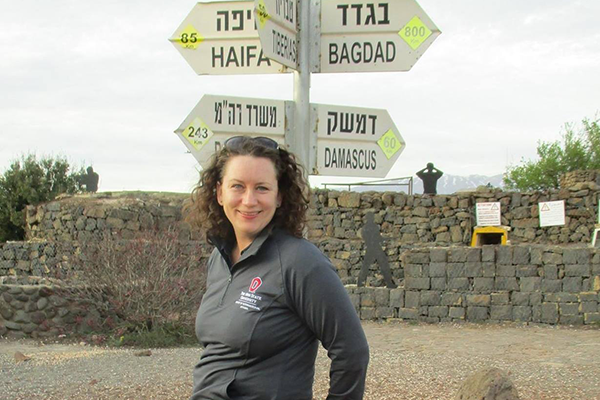December 2021 CSEEES FLAS Alumni Profile: Elizabeth Angerman

Elizabeth Angerman, PhD in Slavic and East European Languages and Cultures, Class of 2010
Summer 2003 FLAS Fellowship Recipient for Advanced Czech
Where do you work and what is your current position?
Currently, I work as the International Partnerships Program Manager in the Office of International Affairs.
Tell us how you got there.
The short(ish) answer is studying abroad! I came to Ohio State as a graduate student in the Department of Slavic and East European Languages and Cultures. During my time as a graduate student, I served for several years as the Resident Director of the Intensive Czech Language Program (one year as a FLAS fellow!). The opportunity to work with students abroad introduced me to the field of international education, where I have ultimately stayed. Initially, I worked as a Program Specialist in the Office of Global Education and I have recently transitioned to my current position.
How has your degree from Ohio State and/or the FLAS program impacted your career?
The specifics of my degree occasionally provide very helpful background for program development and oversight, but I have primarily relied on the broader lessons of an advanced degree in the humanities. It is perhaps a cliché to point out that a liberal arts education prepares its graduates for all manner of tasks, but I have found that the broad background has also fostered both an intellectual curiosity as well as a desire to continue learning. That combination has meant a greater facility to talk to anyone and everyone about anything and everything, a critical skill when one works with the broad range of stakeholders one encounters in the workforce generally and in higher education specifically. Beyond that, graduate training demands self-starting, careful research, attention to detail, perseverance and follow-through. Do I need the particulars of Oblomov’s Dream or the racing troika for my daily tasks? Sadly, no. Am I a better person and better at my job because of them? Absolutely.
What was your focus or research interest when you studied at OSU?
Very technically, I believe my degrees state that my expertise is Russian literature, and I absolutely loaded up on Pushkin, Lomonosov, and Nabokov (among others). I discovered other loves besides Russian literature, and much of the work I did focused on Slavic folklore, Soviet/Russian film, Czech literature, and Czech film. My dissertation looked at literary adaptations in Czechoslovak New Wave cinema and I loved researching that topic.
If you are a traveler, what is one of your favorite trips you have taken?
It’s hard to pick favorites, but I have very fond memories of my time in Olomouc, Czech Republic.
What are your future plans?
I have a job that I really enjoy, and I occasionally get to moonlight as a lecturer in the Slavic Department (vampires, post-Soviet film, and sci-fi, oh my!). I will be quite content with this arrangement for a very long time.
What inspires you?
I love working adjacent to academia. I am constantly inspired by the incredible talent and expertise of the faculty, staff, and students around me. It’s very easy to believe that the world is in good hands after conversations with smarties around campus.
If you work in academia, what advice would you give to current and prospective PhD students?
If I were a graduating senior now (or an older student considering an MA program or a PhD program), I think I would want someone to sit me down and talk me through what professional life looks like. It would have been helpful for someone to question my choices (not necessarily to dissuade me, but to make me really think through what I wanted to accomplish), to remind me that jobs I might want in the future might not have even been dreamed up yet, to assure me that there are a lot of roads to different professions, and simply to tell me what some of those professions ARE. I had a very provincial idea of What Adults Do and What Jobs Adults Have, and someone there to coax me to think big(ger) might have sent me in very different directions. Don’t get me wrong, I’m very happy with where I ended up, but the 1990s allowed for an aimlessness that I don’t think students can afford now. The advice I used to give study abroad students encouraged them to work backwards: where do you ultimately want to be and what are the skillsets we need to get you in order to get you across that finish line? Sometimes those skillsets are found in graduate school, but sometimes they’re not.
